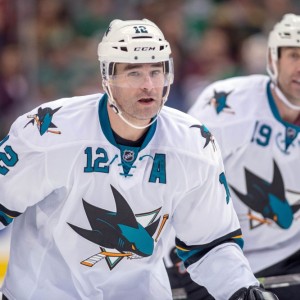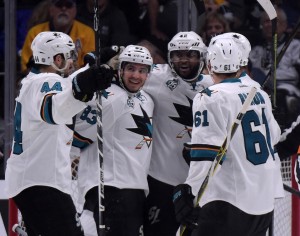The San Jose Sharks lost to a faster team in Game 1 of the Stanley Cup Final. One of the team’s fastest players, winger Matt Nieto, did not play in that game. He is now fully recovered from injury and is ready to go.
Should Sharks coach Peter DeBoer return Nieto to the line-up?
The Local Media Weighs In
The story has caught fire with the media around the San Jose Sharks. Among the sites publishing articles about a potential Nieto return for Game 2 are The Puck Times, Fear The Fin, the Mercury News, the Gackle Report and CSN Bay Area.
I’ll borrow from Fear The Fin and The Puck Times; both sites advocate Nieto’s insertion back into the line-up. They describe where Nieto would best fit and come to a similar conclusion about who comes out. Neither makes a change to the top line.
Current Sharks lines 2-4 are:
2. Patrick Marleau, Logan Couture, Joonas Donskoi
3. Melker Karlsson, Chris Tierney, Joel Ward
4. Dainius Zubrus, Nick Spaling, Tommy Wingels

Fear The Fin sees moving Ward to the second line, skating with Couture and Donskoi. The Puck Times sees Karlsson moving to the second line to join Donskoi and Couture. Both articles see Marleau moved from second line wing to third line center. Both have Nieto as Marleau’s winger. The Puck Times puts Ward as the other winger, Fear The Fin has Karlsson there. Marleau played third line center for much of the season and well into the playoffs. This is actually returning to lines DeBoer had used for a good chunk of the season.
Between the two, I think a Marleau, Nieto, Karlsson line makes the most sense. If you want speed, then build the line for speed. Karlsson is faster than Ward. Ward is the better player, it makes sense to put him on the line which will get more ice time.
Marleau and Nieto are both among San Jose’s fastest players. Moving Marleau would allow him to take most face-offs, a major issue for the third line in Game 1. Between Ward and Tierney, they won just 25%. To neutralize Pittsburgh’s speed, it helps to have the puck.
If the changes follow either path, the fourth line does not need to change, but it might. Danius Zubrus and Tommy Wingels are the wingers so it would come down to Chris Tierney or Nick Spaling at the center spot. The fourth line has been effective with Spaling in the middle, though he has just one point and is even for the playoffs. Tierney has seven points and is plus-4. One article strongly favored Tierney, the other was more neutral.
The Nieto Question
The question is, however, does a Nieto-centric move make San Jose a better team? It makes San Jose a bit faster as a team, but they will still not be as fast as Pittsburgh. If San Jose thinks they can win this series by matching the Penguins speed, they’ll lose. San Jose is like a good fastball pitcher in baseball facing an excellent fastball hitter. Throwing the fastball a bit harder is still playing to the strength of the batter.
The Sharks have been successful because they can diversify their game. To continue the baseball metaphor, San Jose has more than fastballs in their repertoire; they have curveballs and change-ups, too. San Jose’s success has not come from playing their opponent’s preferred style of hockey.

Nieto was a respectable contributor during the season, with 17 points and a minus-8. In the playoffs, he has three points and is plus-1. The only Sharks forwards with fewer playoff points are the current fourth liners. The only forwards with a lower plus-minus are Spaling and Karlsson, both are even. In the games Nieto has missed, San Jose is 5-3. They were 7-4 with him in the line-up. It is hard to make a case for Nieto as a difference-maker.
The Sharks need to push Pittsburgh out of their comfort zone and force then to match up against the Sharks physical size and strength. Pittsburgh has no one who can match Joe Thornton’s size, strength and skill. Get him the puck down low and cycle. Thornton’s linemate, Tomas Hertl, also proved a tough physical matchup for Penguin defenders in Game 1. Dainius Zubrus is bigger and heavier than any Pens player, and though he may be 37 years-old, he was rarely out of position while dishing out six hits.
A McGuffin
Alfred Hitchcock used a device in his movies he called a McGuffin. It is a plot device which appears to be a central issue, but turns out to be of limited importance to the overall plot. The discussion around Matt Nieto is a McGuffin. This is not a shot at Nieto, who is a comparable player with a different skill set compared to those he might replace. Nieto is not the change San Jose most needs.
Ian Cole, Chris Kunitz and Carl Hagelin had five hits each to lead Pittsburgh in Game 1. Cole is listed at 6’1” and the other two are 6’0”. For San Jose, Brent Burns and Zubrus are 6’5”, Thornton is 6’4”. Hertl and Marleau are 6’2” and Ward is a wide-bodied for 6’1”. San Jose’s blue line averages 6’2”. The Sharks are not going to succeed by trying to ‘outsmall’ and ‘outspeed’ Pittsburgh. Cole and teammate Nick Bonino are in the picture below with Joe Thornton; the size advantage Thornton has is obvious.
http://gty.im/536199462
Nieto is the smallest player on the Sharks at 5’11” and 177lbs. He will not make any of the other 17 Sharks skaters smaller or faster. For San Jose to succeed, they need to play a controlled game. To quote John Wooden, “Be quick, but never hurry”. Pittsburgh had the Sharks playing hurried hockey in Game 1. San Jose can play quick in Game 2, but not hurried. Whether Matt Nieto enters the lineup or not, it does not change the basic equation for San Jose. The bigger stronger team is not going to become a different team by inserting one smaller, quicker player into the lineup. The Sharks will still be the bigger, stronger team. In order to win, the Sharks need to play bigger, stronger hockey.
Zeke’s Notes
History has not been kind to teams who fall behind in a series 2-0. Should the Penguins win Game 2, it would put the Sharks into a risky place, needing to win four of five to capture the series. The good news, San Jose has won four out five games twice already in the postseason. They beat the Kings, winning four of five in their first round series. The Sharks lost their series opener to St. Louis in the Western Conference Final, but then won four of the next five to close out the series.